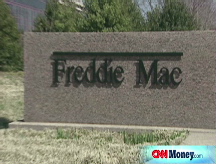Choppy day on Wall Street ends in rally
Stocks soar to end the day as investors focus on positive economic news instead of rising crude prices that had tempered early gains.

NEW YORK (CNNMoney.com) -- The stock market on Wednesday posted strong gains for the second-straight session after fluctuating for most the day.
The Dow Jones industrial average (INDU) gained 186 points, rising 1.6%. That added onto the 266-point rally from Tuesday on the back of strong financial reports, rising consumer confidence and falling oil prices.
The broader Standard & Poor's 500 index (SPX) added 1.7%, but the tech-laden Nasdaq composite index (COMP) lagged behind, rising just 0.4%, due to several negative financial reports from the technology sector.
Rising oil prices put a damper on an early surge for much of the day, but stocks recovered by the session's end as investors focused on an unexpected gain in jobs and government help for the financial and housing sectors.
"That was a bit of a surprise, but there were lots of things going on that gave a bit of encouragement for the market to rally," said Peter Cardillo, chief market economist for Avalon Partners. "Government agencies are doing everything for credit markets to function and get the housing market back on track."
The Federal Reserve said Wednesday it is extending its emergency borrowing program to assist Wall Street banks with liquidity during the credit crisis. The plan was extended until Jan. 30. The U.S. central bank originally said the plan, which began in March, would end in mid-September. (Full story)
"The Fed extending credit is positive news," said Harry Clark, founder and chief executive of Clark Capital Management Group. "It's just going to take some time before the financials can find their footing."
Additionally, after initially threatening to veto the bill, President Bush on Wednesday signed a sweeping measure to offer affordable government-backed mortgages to homeowners at risk of foreclosure. The law will also bolster government-sponsored mortgage finance giants Fannie Mae and Freddie Mac with a temporary rescue plan and stricter regulation. Congress approved the bill last week. (Full story)
"It's going to be some time before we see a positive impact, but over the long term this bill is a good thing," said Bill Stone, chief market strategist with PNC Wealth Management. "The government is throwing everything they can at housing, since they know it is the center of the problem."
Stocks soared at both the open and the close of Wednesday's session after a strong jobs report gave investors hope of a brighter economic outlook.
The U.S. private sector added a seasonally adjusted 9,000 jobs during the month of July, according to Wednesday's ADP employment report. That was unexpected; economists surveyed by Briefing.com had forecast a 60,000-job decline. July marked a significant improvement over June's numbers, when the private sector shed a revised 77,000 jobs. (Full story)
The ADP payrolls survey came two days ahead of the more closely watched employment report from the U.S. Labor Department, which is due out Friday.
"The markets traded pretty well, because more jobs means less loan losses and more people paying their bills," said Stone. "With that said, we get the real number Friday - the ADP has been clocking in better than the government data and isn't a great predictor."
But by midday, blue chips pulled far back - though they still held onto their gains - as a government oil supply report showed a surprise decline in the nation's gasoline stockpile, which countered investor sentiment that U.S. demand was falling. Crude prices rose $4.58 to settle at $126.77 per barrel Wednesday. (Full story)
"Finally we have a day where oil is up but stocks aren't imploding," said Stone. "When oil gets a bounce, financials have gotten whacked, but the economy took the sting out of it."
Thursday on tap: Investors will see if the market can continue its winning streak Thursday, as a slew of economic reports are due. The government will report on real U.S. economic gross domestic product and the so-called GDP "chain deflator," which is a measure of consumer price changes.
The Labor Department will report on initial jobless claims before the opening bell Thursday, and the Chicago Purchasing Managers Association will release a key local manufacturing report as well.
After the market close, coffee chain Starbucks (SBUX, Fortune 500) reported a quarterly loss and revenue that missed Wall Street's estimates. Shares rose slightly in after-hours trading.
ExxonMobil (XOM, Fortune 500), MasterCard (MA) and Motorola (MOT, Fortune 500) are among the big names reporting quarterly financial results before the opening bell Thursday.
Financials rise again: Financial sector stocks responded positively to the Fannie and Freddie rescue bill as well as a government decision to extend a ban on naked short-selling of many bank stocks.
The U.S. Securities and Exchange Commission said late Tuesday that it will continue to ban investors through Aug. 12 from short-selling 19 mortgage finance companies without borrowing the stock. The ban includes 17 large investment banks as well as Fannie Mae and Freddie Mac. (Full story)
Fannie (FNM, Fortune 500) gained 5.3% and Freddie (FRE, Fortune 500) rose 3.7% Wednesday, but some banks fared even better.
For investment banks, Lehman Brothers (LEH, Fortune 500) led the pack with an 8% gain. Also, Morgan Stanley (MS, Fortune 500) rose 5.8%, Merrill Lynch (MER, Fortune 500) gained 2.5% and Goldman Sachs (GS, Fortune 500) also gained 2.5%.
Wachovia (WB, Fortune 500) led banks with an 8.8% gain. Washington Mutual (WM, Fortune 500) added 7%,Bank of America (BAC, Fortune 500) jumped 4.3%, Wells Fargo (WFC, Fortune 500) gained 2.4%, Citigroup (C, Fortune 500) rose 2% and JPMorgan Chase (JPM, Fortune 500) also rose 2% Wednesday.
The financial sector has seesawed in the past couple of weeks, as investors have balanced many banks' quarterly financial reports that came in better than expected with some dour economic news that has renewed fears that the credit crisis will not end anytime soon.
"Financials are going to be mixed for a while as they look to gain traction," said Clark. "The economy is still very fragile now."
Tech earnings: Chipmaker RF Micro Devices (RFMD) swung to a quarterly loss, but the results still beat Wall Street's expectations. The company reaffirmed its outlook, matching analysts' forecasts, and shares surged 16.8%.
But the NASDAQ was restrained by otherwise disappointing financial reports.
GPS navigation device maker Garmin (GRMN) reported quarterly earnings Wednesday that rose 20%, but the company offered tepid guidance. Shares plunged 21.9% Wednesday.
Video game maker Electronic Arts (ERTS) reported a narrower loss in the quarter Wednesday, but the results still failed to meet analysts' expectations. Shares sank 6.6%.
Poor financial results from Ultimate Software (ULTI), down 20.5% and Silicon Motion (SIMO), losing 38.2% also muted the tech sector's gains.
Other corporate news: Financial rating and analysis company Moody's (MCO) reported earnings that fell 48% from a year earlier, but results managed to beat analysts' expectations. Shares fell 2.5%.
Media company Comcast (CMCSA, Fortune 500) reported quarterly profit rose 8%, but missed Wall Street forecasts. Still, the company reaffirmed its guidance, and the stock rose 4.6%.
Drugmakers Wyeth and Elan announced late Tuesday that results of a study of experimental Alzheimer's Disease drug bapineuzumab were inconclusive and did not live up to expectations. Shares of Wyeth (WYE, Fortune 500) tumbled 11.9%, and Elan (ELN) plunged 41.8% Wednesday.
Market breadth was positive. On the New York Stock Exchange, advancers edged out decliners by a ratio of 2 to 1 on a volume of 1.5 billion shares. On the Nasdaq, losers beat winners on a 5-to-4 ratio on a volume of 2.3 billion shares.
Gas prices: The average price of gasoline fell 1.5 cents to $3.926 per gallon in the United States, declining for the 13th straight day, according to a daily survey from motorist advocacy group AAA. (Full story).
Other markets: In currency trading, the U.S. dollar wavered after an early rally, but showed slight gains against foreign currencies by the time the market closed. Tuesday, the dollar hit a one-month high versus the euro. (Full story)
COMEX gold for August delivery fell $13.60 to settle at $902.90 per ounce. Gold traded below the $900 level for much of the day Wednesday.
Treasury prices were mixed Wednesday, with the yield on the benchmark 10-year bond holding steady at 4.05% from late Tuesday. Bond prices and yields move in opposite directions. ![]()




